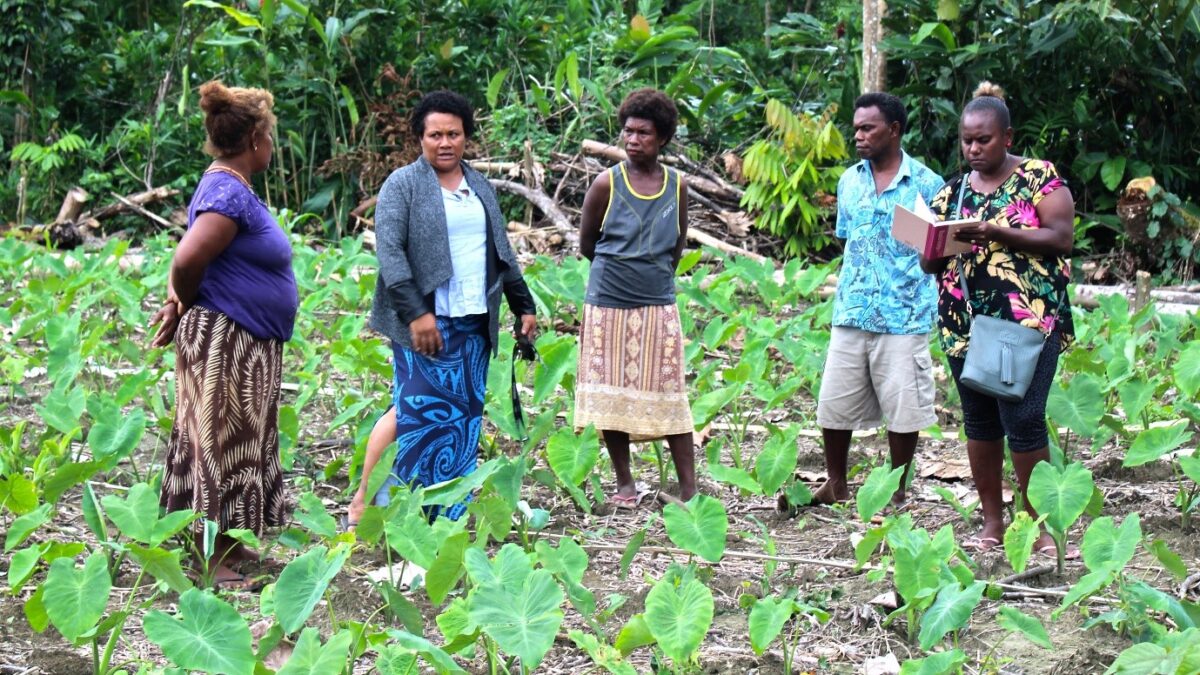

PS of MAL Ethel Frances, with members of Komukama taro farmers and Guadalcanal Province agriculture field officers during the visit.
Agriculture team visits Komukama women Taro farmers, Guadalcanal
A joint team of senior officers from the Ministry of Agriculture and Livestock Extension Department (MAL) and Guadalcanal Province Agriculture Extension Division paid a field visit to Komukama Women Taro farmers group in North East Guadalcanal on 29 September.
Guadalcanal Province Agriculture Extension division organised the field visit.
Also gracing the trip was the Permanent Secretary of MAL Ethel Frances.
The visit provided an opportunity for the agriculture team to observe challenges that farmers there are facing, discuss their critical needs and talked over how MAL through its Guadalcanal Province Extension office (Agriculture Division) can assist.
PS Frances said she was pleased to note that such initiatives have been introduced to encourage women participation in agriculture, particularly taro farming.
“MAL recognises the importance of food security and nutrition for all communities in the country,” Ms. Frances said.
She said women plays a very important role in our homes not only as housewives but as income earners.

A taro root crop variety being planted at Komukama farm.
“On behalf of the government, we are grateful for your involvement in agriculture, especially in Taro farming. You are contributing towards our nation’s food security.
“Your efforts with other farmers alike across the country for ensuring diverse and nutritious food always accessible for people is much appreciated,” she said.
Ms. Frances also acknowledged the Komukama women’s group hard work despite challenges faced adding the ministry will look at ways possible to assist.
“We have noticed your hard work, thus, we (MAL) will work on how to support you.”
The Permanent Secretary is looking forward for future partnership with Komukama women Taro farmers.
Chief Field Officer of MAL Extension Department, Lily Wame said women involvement in agriculture livelihood is an important aspect as agriculture is concern, therefore, every women farmers must be commended for choosing farming as your undertaking.
“Producing food is a very important role, for it contribute much to the nation’s food security to ensure our children and citizens have food to sustain their livelihood.”
Mrs. Wame encourages the women not to give up despite challenges faced but believe in what they are doing and continue to invest into taro farming.
“This visit and discussions will give us (MAL) room to look at ways we can assist and to put you as priority in our plans and further deliberations.”
She added the visit is also important as it provided an opportunity for officers to see the challenges and needs of farmers so that they can make concrete decisions for potential support.
Meanwhile, Mrs. Wame said with the rise in Non-Communicable Disease (NCD) cases in the country, changing diet to root crop like Taro is significant.
“Your involvement in taro farming is not a mistake. You involve with the right root crop. People will soon go for taro to substitute their diets as measures to address health issues like NCD’s which is on the rise at the moment.
“So you are not wrong but you are taking the right path to grow taro for food and for income as well,” Mrs. Wame told the women taro farmers at Komukama.
Chief Field Officer for GP Extension office (Agriculture Division) Joseph Wotomaru while sharing the same sentiments said seeing women boldly participating in agricultural activities is so encouraging.
He said mothers are the backbone of the family and they are the ones who always make sure their children or households have something (food) to eat, likewise, they (women) are the ones who always ensure food is available in the gardens for market to feed the people.

James Viriale a farmer who really supported women farmers in her community at Komukama to go into taro farming have a chat with PS of MAL Ethel Frances.
Mr. Wotomaru also encourages the women farmers to continue with the good work as his office (GP Agriculture Division) will liaise with the mother ministry (MAL) to look for potential assistance to boost their taro farming production.
In response, Nester Tagharogoa who spoke on behalf of the women farmers at Komukama thanked PS Frances and her team for the visit.
She said the visit was the first of its kind adding such visitation gives them assurance and hope that they are not forgotten by the government.
“We only used basic simple tools to do farming with basic knowledge and skills.
“Now that we are growing this root crop to a larger scale, capacity training is required for us to boost our knowledge and skills to improve our productions,” she stressed.
Ms. Tagharogoa also used the opportunity and highlighted challenges they are facing as farmers to the agriculture team.
ENDS///